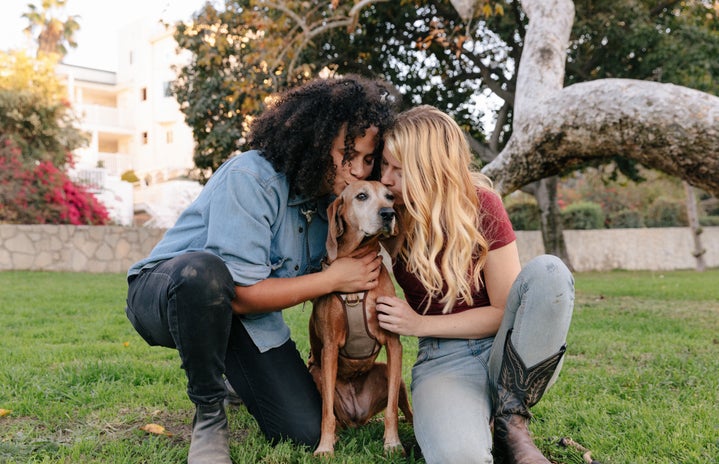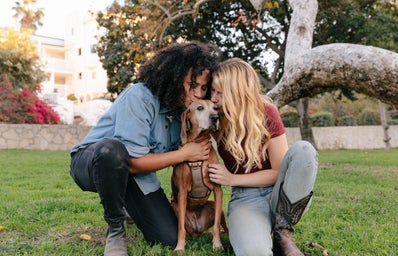Calling all dog lovers!
If you are a dog lover like I am then you certainly will not want to skip this article about a dog’s ability to love and interesting discoveries!
Some experts want us to avoid anthropomorphizing animals, not to compare them too directly to us; however, in recent years research has recorded emotional and cognitive similarities, like the dog’s ability to love, exhibit compassion, make plans, hold beliefs, and even grieve.
In Ben Harris’ magazine, The Ultimate Guide To The Animal Mind, Pamela Weintraub gives an overview of several studies of dog behavior and cognition based on her interview with Clive Wynne, founding director of the Canine Science Collaboratory at Arizona State University. Weintraub writes about Clive Wynne’s book, Dog Is Love. Wynne’s book brings me warmth and comfort because he speaks so profoundly of the dog’s intelligence and capacity to love and get along with humans. Canines are perceptive and intuitive. Wynne, a psychologist, and ethologist, claims there was a revival in the study of canine cognition in the 1900s when scientists wanted to know what makes dogs special and so understanding of human minds. Wynne knew to test this claim that there is something unique about an animal or species, you must show a significant difference from others. In this case, he had tested the difference between the wolf and its descendant, the dog! He was invited to Wolf Park in Indiana to start observing hand-rearing wolves’ behavior compared with pet dogs. To much surprise, the wolves were following human intentions as good as dogs. An important factor in the success of following human actions is whether they were raised by humans. Wynne conducted a test closely formatted to this with bats at a conservancy. His team found that the bats who had been pets by humans starting at an early age understand people’s intentions better than bats reared by their mothers. It was concluded that what matters is your early life experiences. Following his findings in both studies (bats and dogs), Wynne was disliked by those who interpreted him saying there was nothing special about dogs. He simply found that there was a lack of unique cognitive abilities.
Years later, Clive Wynne adopted his own dog Xephos, a Florida mutt. As his human-canine bond developed, Wynne noticed Xepho could not contain his excitement at Wynne’s every return home, whereas with any person or family member would not get particularly excited. He could not resist another test to find what makes the dog special and explain this phenomenon. The test was set up like this: an owner was out all day at work and the dog did not have any food during the time. There was a bowl set up in the garage while the human returned home, entering from another location in the garage. The dog was let in through a door at the time of return and was faced with a choice to seize the food or run to his beloved human. According to the findings, the human is more important to the dog in that moment than the food, even to a hungry dog! This is the case for many dogs in human homes. You must test this on wolves if you want to claim that this is special and unique about dogs.
Another test using a simple method was conducted. You have a person sit in a chair and draw a circle around the chair. A radius of 1-meter is marked, about 3 feet and the person in the chair sits in the center. The time measured is set for two minutes during which the scientists answer the question: How much time does the animal spend inside the circle up close to the person? They do this with a person with a deep familiarity to the wolf and with a stranger. They found that wolves spend a quarter of the time interval inside the circle with their special person and very little time with a stranger. In doing the same test with people’s dogs, they found that the dog spends most of the time with their special person in the circle and a quarter of the time (as much as the wolves spend with their special person). Let me say that again. Dogs spend the same amount of time with a stranger as a wolf spends with the special person. By this time, Wynne was at the University of Arizona, and had collaborated with a geneticist working to identify three genes that mutated during evolution from wolf to dog. Humans have occasional mutations in the three genes too, resulting in Williams Syndrome, which has a distinct feature of being crazy friendly.
Gregory Berns, at Emory University in Atlanta, has trained dogs to lie still in MRI scanners to observe brain activity while awake and signaled a hot dog reward or their special human nearby. Scans show greater activity in the reward center when their human is nearby compared to a hot dog nearby. Wynne then answers the question: Is a dog’s entire being cued to love their human companion? In Australia, researchers used a heart rate monitor on a person and connected it onto the person’s dog. The person and pet dog sat together on a couch, and sure enough their hearts start to beat synchronously! Other tests were run while the person and their dog look at each other. The levels of the love hormone, oxytocin, spiked in the dog and human. This is also true for nursing mothers and their infants, and new romantic partners, but not old married couples.
For all new, existing, and future dog owners:
A takeaway from Wynne’s Dog Is Love is to not leave this highly social and loving animal home alone for a prolonged period because it is just cruel. This neglect should be avoided. Doggy daycares are diverse, find a dog walker, or just sit with your dog for some time. Also, make pointless trips out for short periods of time to get your new pup acclimated to time alone away from you, the beloved human. Dogs love the company of people. And remember, the relationship between you and your dog is driven by reinforcement and love, not social status! Happy Adopting and Rescuing!


